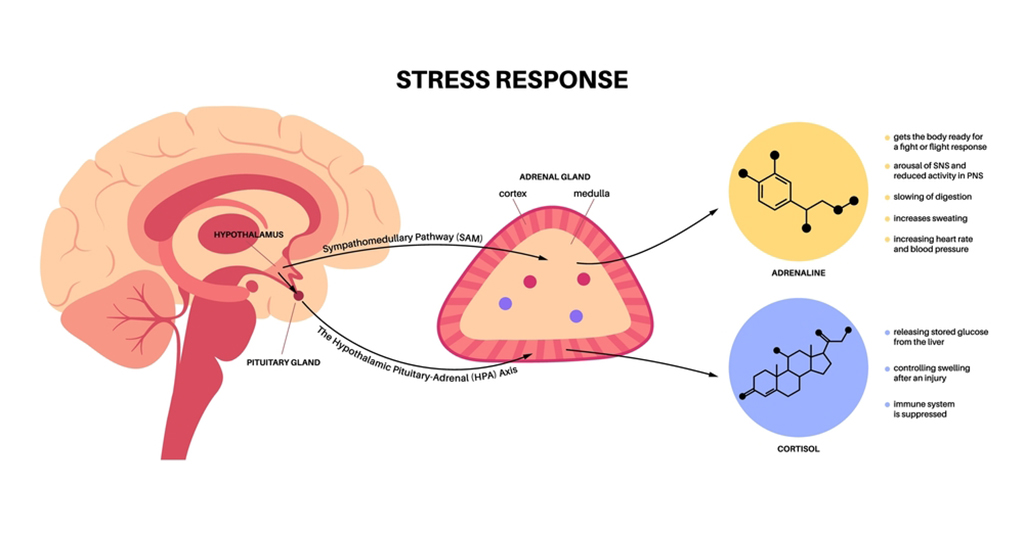What is Cortisol Balance?
Cortisol, often referred to as the “stress hormone,” is a vital hormone produced by the adrenal glands, which sit just above the kidneys. While cortisol is essential for managing stress, it plays several other crucial roles, including regulating blood sugar, reducing inflammation, supporting metabolism, and maintaining energy levels. In a balanced state, cortisol helps the body function optimally, following a natural rhythm—high in the morning to wake us up and low at night to prepare us for rest.
However, when cortisol levels become imbalanced—either too high or too low—this can lead to a cascade of health issues. Cortisol imbalance is often triggered by chronic stress, poor sleep, unhealthy diets, or adrenal fatigue. Understanding its symptoms and learning how to restore cortisol balance naturally can significantly improve your physical and mental well-being.

“Cortisol has a natural rhythm that’s essential for health. When that rhythm is disrupted—whether from stress, diet, or lifestyle—it can wreak havoc on the body,” explains Dr. Mark Hyman, functional medicine practitioner and author of The UltraMind Solution.
Symptoms of Cortisol Imbalance
When cortisol levels are out of balance, the symptoms can vary depending on whether you are experiencing high cortisol (hypercortisolism) or low cortisol (hypocortisolism). Both conditions impact your overall health, and recognizing the warning signs is the first step toward achieving balance.
High Cortisol Symptoms
Excess cortisol, often caused by prolonged stress or an overactive adrenal response, can disrupt multiple systems in the body:
- Weight Gain: Especially around the abdominal area, caused by cortisol’s effect on fat storage.
- Chronic Fatigue: Despite getting enough sleep, your body may feel perpetually exhausted.
- Sleep Disruptions: Elevated cortisol levels at night interfere with deep, restful sleep, leading to insomnia.
- Anxiety and Irritability: High cortisol can overstimulate the nervous system, making you feel anxious, jittery, or moody.
- Suppressed Immunity: Chronic cortisol elevation reduces your body’s ability to fight infections.
Low Cortisol Symptoms
On the other hand, low cortisol levels are often associated with adrenal fatigue, which occurs when prolonged stress depletes the adrenal glands. Symptoms of low cortisol include:
- Persistent Fatigue: A lack of cortisol leads to low energy levels throughout the day.
- Dizziness or Lightheadedness: Especially noticeable when standing up quickly.
- Low Blood Pressure: A common sign of adrenal insufficiency.
- Salt Cravings: Your body may crave salty foods as it tries to stabilize blood pressure.
- Mood Swings: Depression, low motivation, and apathy are often linked to low cortisol.
Whether high or low, cortisol imbalance can significantly impact your quality of life. Addressing the underlying causes and restoring balance is essential for your overall health and vitality.

“When cortisol levels remain elevated for too long, it can lead to adrenal dysfunction. Symptoms like unexplained fatigue and stubborn weight gain are often early indicators,” says Dr. Sara Gottfried, author of The Hormone Cure.
How to Restore Cortisol Balance Naturally
Restoring cortisol balance requires a combination of stress management, lifestyle changes, and proper nutrition. Here are proven methods to help you achieve optimal cortisol levels naturally:
1. Manage Stress Effectively
Chronic stress is the most common cause of cortisol imbalance. Incorporating stress-relieving practices into your daily routine can significantly lower cortisol levels. Mindfulness techniques, such as meditation and deep breathing exercises, help calm the mind and reduce the body’s stress response. Yoga, tai chi, or simply spending time in nature can also promote relaxation and lower cortisol production.
“Mind-body practices such as yoga and meditation can significantly lower cortisol. They reduce the stress response and activate the parasympathetic nervous system,” shares Dr. Andrew Weil, integrative medicine expert.
2. Prioritize Quality Sleep
Sleep is directly linked to cortisol balance. Ideally, cortisol levels should follow a natural rhythm: peaking in the morning to give you energy and gradually decreasing throughout the day. Poor sleep disrupts this cycle, leading to elevated cortisol at night. To improve sleep quality, create a calming bedtime routine, avoid screens before bed, and aim for 7-9 hours of uninterrupted sleep.
“Sleep is crucial for hormone regulation. Prioritizing 7-9 hours of quality sleep can naturally reset cortisol levels,” states Dr. Matthew Walker, neuroscientist and author of Why We Sleep.
3. Adopt a Balanced Diet
Your diet plays a crucial role in supporting adrenal health and cortisol regulation. To restore cortisol balance, focus on nutrient-dense foods:
- Magnesium-rich foods: Spinach, avocado, and nuts help relax the nervous system and lower stress levels.
- Omega-3 fatty acids: Salmon, chia seeds, and walnuts reduce inflammation and cortisol spikes.
- Adaptogenic herbs: Ashwagandha, holy basil, and rhodiola are powerful natural remedies for stress and adrenal support.
Avoid excessive caffeine, sugar, and processed foods, as these can overstimulate the adrenal glands and disrupt cortisol levels. Instead, eat balanced meals throughout the day to stabilize blood sugar and promote hormone balance.
“Magnesium and adaptogens play an important role in regulating cortisol and supporting adrenal function,” notes Dr. Josh Axe, clinical nutritionist and author of Eat Dirt.
4. Incorporate Moderate Physical Activity
Exercise is an excellent way to regulate cortisol, but moderation is key. While intense workouts can spike cortisol temporarily, gentle activities like walking, swimming, or yoga can help lower cortisol and boost mood. Find activities that you enjoy and make them a regular part of your routine.
“Regular, moderate-intensity exercise—like walking, yoga, or swimming—helps lower cortisol levels naturally,” says Dr. James L. Wilson, author of Adrenal Fatigue: The 21st Century Stress Syndrome.
5. Use Natural Supplements
Certain natural supplements can support cortisol balance. Adaptogens like ashwagandha and ginseng help the body adapt to stress, while B vitamins, Vitamin C, and magnesium provide essential nutrients for adrenal function. Incorporating healthy fats like MCT oil can also stabilize energy levels and support hormone production.
“Supplements like ashwagandha have been shown to lower cortisol in stressed individuals, making it a natural and effective remedy,” explains Dr. Aviva Romm, herbal medicine expert.

Conclusion: Achieve Cortisol Balance for Better Health
Cortisol balance is vital for maintaining physical, mental, and emotional well-being. An imbalance—whether too high or too low—can disrupt your sleep, mood, weight, and overall health. Fortunately, by managing stress, improving your sleep, adopting a healthy diet, and engaging in regular physical activity, you can naturally restore cortisol levels and reclaim your energy and vitality.
Take the time to listen to your body, identify the symptoms of cortisol imbalance, and implement these natural strategies to support hormonal harmony. Achieving cortisol balance may require consistency and patience, but the rewards for your health are well worth it.
References:
- Hyman, M. (2008). The UltraMind Solution: Fix Your Broken Brain by Healing Your Body First. Scribner.
- Gottfried, S. (2013). The Hormone Cure: Reclaim Balance, Sleep, Sex Drive, and Vitality Naturally. Scribner.
- Weil, A. (2004). Spontaneous Healing: How to Discover and Enhance Your Body’s Natural Ability to Maintain and Heal Itself. Ballantine Books.
- Walker, M. (2017). Why We Sleep: Unlocking the Power of Sleep and Dreams. Scribner.
- Wilson, J.L. (2001). Adrenal Fatigue: The 21st Century Stress Syndrome. Smart Publications.
- Axe, J. (2016). Eat Dirt: Why Leaky Gut May Be the Root Cause of Your Health Problems and 5 Surprising Steps to Cure It. Harper Wave.
- Romm, A. (2014). The Adrenal Thyroid Revolution. HarperOne.

























Leave a Reply